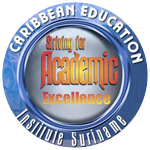Biology
Biology explores the levels of organization of life, from the molecular level, through cellular to higher levels. It includes developing an understanding of the interactions within and between organisms and between organisms and their environment. The study of biology recognizes, however, that humans have a greater influence on the environment than other species. The study of biology, therefore, is designed to assist students to recognize their responsibility to conserve, protect, maintain and improve the quality of the biological environment for future generations.
The Biology Syllabus is designed to allow students to work individually and with others in practical, field and interactive activities that are related to theoretical concepts in the course. It is expected that students will apply investigative and problem-solving skills, effectively communicate scientific information and appreciate the contribution that a study of biology makes to their understanding of the world. The syllabus will assist students to develop positive values and attitudes towards the living components of the environment and will also provide a sound foundation for those who wish to pursue further studies in the sciences.
The syllabus is arranged in five sections as follows:
Section A - Organisms in the Environment
Section B - Life Processes
Section C - Continuity and Variation
Section D - Disease and its Impact on Humans
Section E - The Environment and Human Activities
Human and Social Biology
Human and Social Biology is concerned with the study of the structure and functioning of the human body. It also involves the application of biological principles, knowledge and skills, and technological advances, to the maintenance of health and to solve the problems of living together. The subject incorporates the view that human beings have a responsibility to their environment and, as such, have an obligation to conserve, protect, maintain and improve its quality.
The CSEC Human and Social Biology syllabus is designed to allow students to work individually and cooperatively, utilizing theoretical concepts of the course in interactive and practical activities. Students are expected to apply investigative and problem-solving skills, be effective in communicating scientific knowledge and demonstrate an appreciation for all living organisms in their environment.
The CSEC syllabus in Human and Social Biology provides Caribbean students with a foundation for further study in fields where an understanding of the structure and functioning of the human body and the application of biological principles to the maintenance of health have relevance. It also helps to provide students with knowledge, skills and attitudes that are important for maintaining a healthy lifestyle.
The syllabus is organized under five main sections:
- Living organisms and the environment.
- Life processes.
- Heredity and variation.
- Disease and its impact on humans.
- The impact of health practices on the environment.
Chemistry
Chemistry is concerned with the physical and chemical properties of substances and the interaction of energy and matter. Principles of Chemistry are applied to the search for solutions to societal concerns and problems, including the depletion of known sources of energy, the extinction of some species through environmental pollution and the struggles of humans to create the conditions for sustainable development.
The study of Chemistry involves an investigation into chemical reactions and processes. The discipline attempts to explain and predict events at the atomic and molecular level. The study of chemistry, therefore, provides students with an understanding of the nature of matter and the behaviour of substances.
The Chemistry Syllabus is designed to allow students to work individually and with others in practical, field and interactive activities that are related to theoretical concepts in the course. It is expected that students will apply investigative and problem-solving skills, effectively communicate scientific information and appreciate the contribution that a study of chemistry makes to their understanding of the world. The syllabus will assist students to develop positive values and attitudes towards the environment and will also provide a sound foundation for those who wish to pursue further studies in the sciences.
The syllabus is divided into three sections:
Section A - Principles of Chemistry
Section B - Descriptive Chemistry
1. Organic Chemistry
2. Inorganic Chemistry
Section C - Chemistry in the Home
Integrated Science
The syllabus is based on three themes
The Organism and Its Environment,
The Home and Workplace,
and Energy
Chosen because, they adequately reflect the common areas of human activity and experience. These themes form the unifying points of the syllabus which should, therefore, be seen as a coherent unit. Integrated Science is a subject in its own right, encompassing topics mainly from Physics, Chemistry and Biology. Indeed, if such distinctions were made, other components such as Earth Sciences and Meteorology would also be recognized.
The CSEC Integrated Science syllabus is designed to allow students to work individually and cooperatively, utilizing theoretical concepts of the course in interactive and practical activities. Students are expected to apply, scientific principles, investigative and problem solving skills, be effective in communicating scientific knowledge and demonstrate an appreciation for all living organisms in their environment.
The Integrated Science syllabus is intended to contribute to the science education needs of Caribbean secondary level students in the following groups:
- those whose abilities, aptitudes and choice of courses will allow them to pursue only one science subject, or who wish to pursue a science course in the interest of a rounded general education;
- those who study science-related subjects such as Home Economics, Physical Education and Sport and Agricultural Science, or who intend to go on to studies at the tertiary level, for careers in areas, such as, nursing and teaching.






